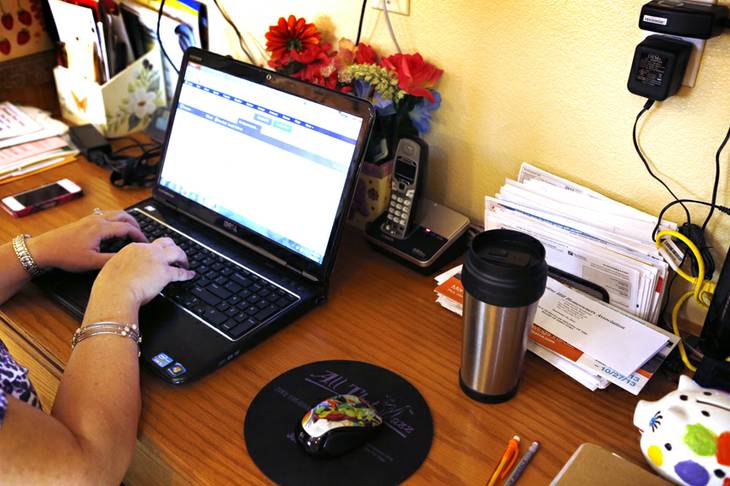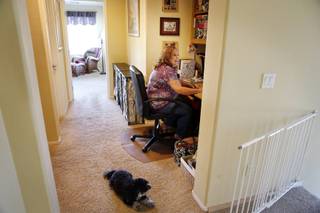It’s 10:30 a.m. on a workday. Most sales reps have donned suits, settled into their corporate offices and probably attended a meeting or two.
Not Julie Wilson. She is wearing casual clothes and just finished looking in on her infant son. She has fewer than 10 minutes to jump on a conference call, which she’ll do from a sitting room/home office off her bedroom. When the conference call ends, she’ll move a load of laundry from the washer to the dryer.
Wilson, a medical management account executive at American Health Holding, is one of millions of Americans who telecommute. Working from nontraditional settings offers them flexibility that normal 9-to-5 gigs don’t. They communicate with the outside world via email, instant messaging and Skype and typically spend parts of their day dropping off spouses at work, going to the gym, picking up children from school or starting dinner, knowing they can always work late at “the office” to meet a deadline.
While some bosses are skittish about letting employees work from home, others view telecommuting, also known as teleworking, as a fringe benefit that reduces costs and keeps workers happy and productive.
“Teleworking is more than just working from home,” said Chuck Wilsker, president, CEO and co-founder of the Telework Coalition, known as TelCoa. “It’s working independent of location.”
TelCoa advocates for the telecommuting community, teaching employers about the benefits of working remotely and educating managers about technology that can enhance the at-home work experience.
It’s unclear exactly how many people telecommute nationally. Wilsker said there haven’t been any comprehensive studies on the topic. But it’s fairly common.
“It could be between 30 and 40 percent of the workforce, but we’re not talking about all the time,” he said. “It could be once a week or twice a month, and then you get into terminology. You ask people if they telework, and they say no because they don’t know what that means. ‘Do you telework?’ ‘No.’ ‘Where are you now?’ ‘I’m working from home.’ ”
People work from home for a variety of reasons: scheduling, family obligations, weather concerns, traffic.
Wilson started working from home when she had a baby.
“The biggest thing for me is that with my son, it would have been really hard for me — as I’m sure it’s very hard for a lot of moms — to leave your baby at six weeks and go back to work,” Wilson said. “I didn’t have to do that. I had to go back to work but not to the office.”
A nanny cares for Wilson’s 18-month-old son, but Wilson can check on him whenever she likes.
“I just walk downstairs,” she said. “So not only can I get my work done, but I can manage my child care on-site.”
“Before I started doing this, I think I would have told you that I prefer to work in an office because I liked the interaction and the camaraderie,” Wilson continued. “But now, I think of it as a time-saver. You don’t have to commute. You don’t have to get ready in the morning. You can dress casually, even stay in your pajamas if you want to. You don’t have to fight traffic, and you don’t have to spend as much money for gas.”
Some employers may shudder to think of their employees sitting in front of home computers in their pajamas, but not all teleworkers equate working from home with casual dress, or a casual attitude.
“My rule of thumb is that I wake up every morning as if I’m going into an office and get fully dressed as if I am,” public relations executive Marina Nicola said.
Nicola formed Vox Solid Communications in 2011 with her business partner, Erika Pope. The company has no formal office.
“I think it’s important to keep the mentality that you’re at work, even though you’re at home,” Nicola said.
Nicola and Pope require their employees, who also work from home, to create a weekly list of tasks and make sure they’re completed by the end of the week.
“We all have to-do lists, and we all have objectives that have to be reached by a certain deadline,” Nicola said.
Does she ever worry about employees goofing off when they should be working?
“We actually have a lot of trust in each other, and everybody who is on our staff is experienced and knows their responsibilities,” she said. “We have the self-discipline, the desire and the ability to work from home, so we feel we’ve earned it. It’s almost like a gift.”
Pope said schedule flexibility is the best advantage of telecommuting. She juggles her professional career with her work as a wife and mother to three children, ages 6, 4 and 3 months.
“I honestly don’t know how I would manage it if I had a regular office job, on the clock and monitored,” Pope said.
Events consultant Debra Gorov said teleworking allows her to live a well-balanced life.
“I’m really able to set my own schedule, and that’s important to me,” said Gorov, who organizes parties from her home office. “I may start working at 6 o’clock in the morning when I first wake up. I take my kids to school and pick them up. Sometimes, I’ll take them out to do something. It works for me because it allows me to have my family time at the same time that I have my work time.”
Gorov admitted that because she works from home, she sometimes puts in too many hours. Wilson said she often goes back to work for an hour or more after putting her son to bed.
Working from home has required Wilson to become a more efficient time manager, she said. She has learned that she can easily work overtime if she loses track of the clock. What she expected to be 10 minutes of checking email can rapidly snowball into an hour of following up on details.
But not everybody has bought into telecommuting. Wilsker said the movement took an especially big hit when Yahoo CEO Marissa Mayer killed her company’s work-from-home policy, a move that garnered international attention.
“She said it wasn’t so much about distractions as it was about encouraging collaboration,” Wilsker said. “But today’s technologies allow for video collaboration. If you and I have Skype and cameras, we could just as easily talk online.”
Zappos CEO Tony Hsieh outlined a viewpoint similar to Mayer’s in his book “Delivering Happiness,” in which he argues that interaction with colleagues is necessary. An important part of the Zappos culture is encouraging “employee collisions” to help workers interact and develop ideas.
That isn’t to say Hsieh is totally opposed to the idea of telecommuting.
“I think if more employees held meetings in their homes, invited folks that were interested in Zappos or downtown to come into their homes, etc., I actually would be all for that and think that it would be a good thing for our culture and brand,” Hsieh wrote to an employee who questioned him about his perceived anti-telecommuting views. “I think being out and about in the downtown community is actually our next evolution and I think it may actually be better than being in an office, or perhaps it should be split 50-50.”
Wilsker contends that there are just as many distractions, if not more, in a traditional workplace than at home.
“Actually, I think people who telework are more productive because there are fewer distractions,” Wilsker said. “(In an office) on Monday morning, people are still talking about football, the Emmys or ‘Breaking Bad.’ They aren’t necessarily focused on work.”
Many employers who prohibit telecommuting believe they can better manage productivity when workers are in their cubicles.
“The biggest excuse I get is, ‘How do I know they’re working when they’re home?’” Wilsker said. “My comeback is, ‘How do you know they’re working in the office?’ In the office, there’s Facebook, Twitter and personal email accounts.”
“I would actually argue that one is more productive working from home than in an office,” he continued. “Sure, if I’ve been working at my desk for a few hours I might take a break and throw in a load of laundry. However, if you compare that with an office, there may be people who come in just to chat, and you’re trying to get them out of your office to get some work done. You don’t have those sidebar conversations that take away your day.”
Employees who work from home also tend to be more loyal to their companies, advocates say.
“One of the things that costs businesses a whole lot of money is turnover,” Wilsker said. “To hire somebody and get them trained may cost one to five times their annual salary. But once employees have (teleworking) as an option, workers are going to be less inclined to take another job that doesn’t offer it. I’ve seen people reject a 25 percent increase in pay because the new job required them to be in the office.”
Employees also save money working remotely. TelCoa found that workers can save up to $8,000 a year telecommuting because of decreased transportation costs, lower clothing bills and eating fewer meals out.
“I used to wear a suit to work every day, but not anymore since I’ve begun working from home,” Wilsker said. “My suits are hanging in my closet most of the time, and my dry-cleaning bills are really low. At home, it’s sweats in the winter and shorts and tank tops in the summer.”
If a home office is used exclusively for work, employees can claim a deduction on their federal income taxes. They also can write off business equipment, such as phone lines and Internet access.
Employers can save, too — up to $20,000 a year per employee, according to TelCoa.
A Washington, D.C., insurance office, for example, allowed half of its 40 staffers to work from home at least half the time as an experiment. As a result, the company downsized into an office a third of the size, saved on supplies and services, and in a year and a half, hasn’t lost a single employee to a competitor.
“The change also allowed them to improve customer service,” Wilsker said. “One of their big clients sent an email at 8:45 p.m. saying, ‘Something important has come up. Please get a hold of me first thing in the morning to get it fixed.’ The guy was at home, and like most people, he didn’t turn his computer off, so he got the message at 9 p.m. and called him up right then. The guy said, ‘Hey, it’s 9 p.m., why are you calling me?’ and he said, ‘You said it was important.’ He got it resolved. That is now a client for life.”
Wilsker said telecommuting also provides benefits for the larger community.
“It’s good for the environment,” he said. “It’s good for society. It’s good for employers and good for employees. And there are little things, too. There are neighborhoods where kids come home from school and there are no adults around. Some of our teleworkers have told us that when their kids come home, there’s an adult presence so there’s less opportunity for neighborhood trouble.”


